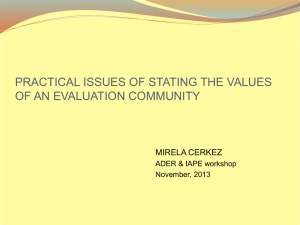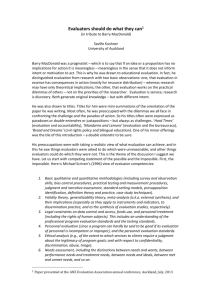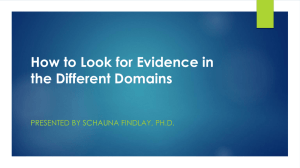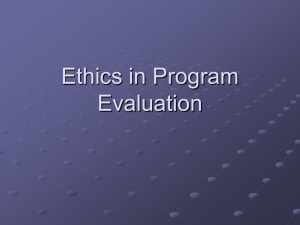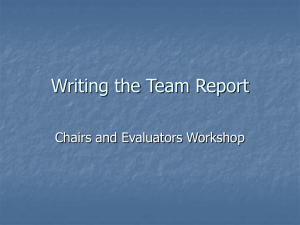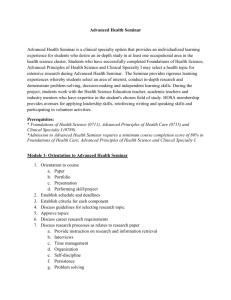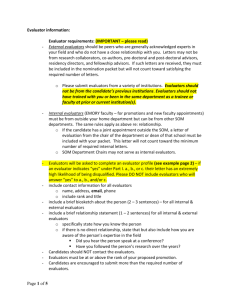Guidelines for the Ethical Conduct of Evaluations
advertisement
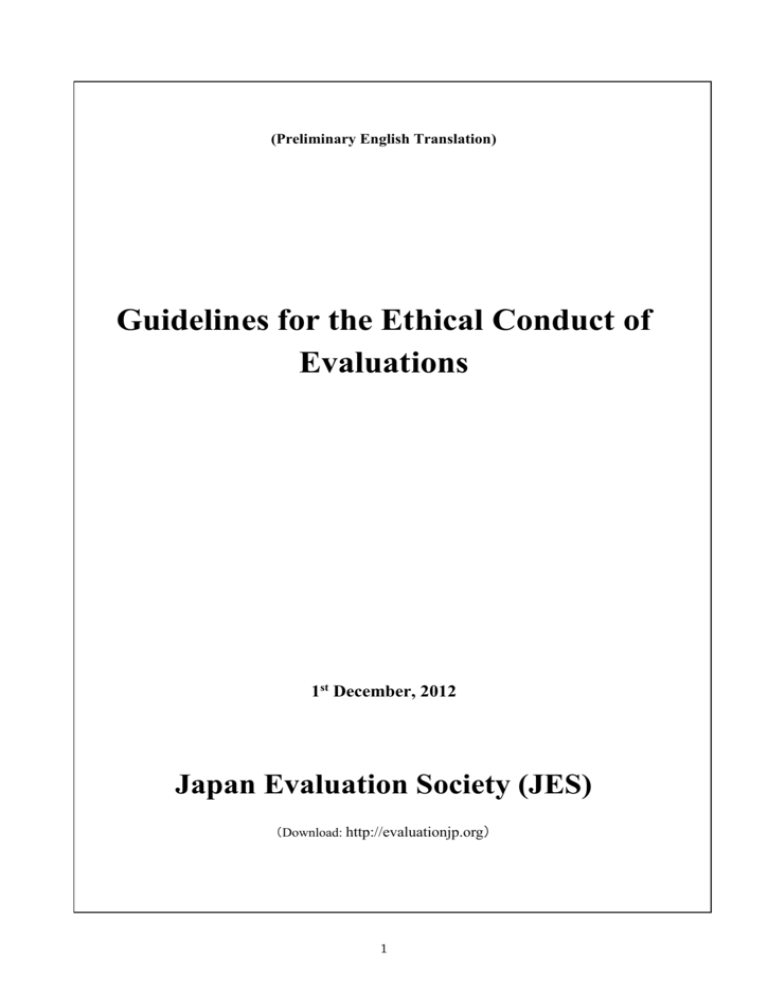
(Preliminary English Translation) Guidelines for the Ethical Conduct of Evaluations 1st December, 2012 Japan Evaluation Society (JES) (Download: http://evaluationjp.org) 1 Background, Relationship between Principles and Codes, and Expected Users 1. Background and Process of Development Most professions such as certified public accountants, lawyers and medical doctors have a code of ethics and ethical principles for establishing their own practical standards. And many evaluation societies in other countries such as American Evaluation Association (AEA), Canadian Evaluation Society (CES), French Evaluation Society (SFE) and Australian Evaluation Society (AES) also have their own ethical codes for evaluators. In this context, in November 2008, the Board of Japan Evaluation Society decided to create a working group, the Subcommittee of Evaluators’ Ethics and Standards (SEES), in order to formulate their own ethical codes. For the purpose of submitting a proposal of ethical codes to the board, the subcommittee started work in January 2009 and had 30 meetings as frequently as once a month until June 2011. During that time, they conducted the following works and steadily advanced the discussion. ・Reviewing existing ethical codes and standards of evaluation societies in other countries and of academic research fields, ・Reviewing ethical codes of other professions in Japan, ・Hearing reports of and discussing practical cases and ethical issues by guest speakers from some evaluation domains, ・Conducting surveys to members of the society, and others. Based on the knowledge obtained by the activities and the discussion conducted in the meetings, SEES proposed the “Principles” at the 11th Annual Conference of the Japan Evaluation Society in November 2010 and the “Codes”, which are based on the Principles, at the 8th Spring Conference in June 2011. After extended discussion and necessary modification, SEES here proposes the Guidelines for the Ethical Conduct of Evaluation. The Guidelines need to be constantly revised. Furthermore, they might need to be used with some additional guidelines in consideration of the particularity of each evaluation domain. 2. Relationship between Principles and Codes “Principles” provide certain ethical norms that professions should act in compliance with, while “Codes” (standard procedures) are defined as expected manners in their practice on the basis of professional competence. In many cases of evaluation practices, ethical matters are likely to have deep connections with the procedure, “Codes”, but reversely, procedural behaviors based on the “Codes” often need ethical considerations. For this reason, we put together both “Principles” and “Codes” for the Guidelines rather than separate them. 3. Expected Users: Considering the Current Situation in Japan Expected primary users of the Guidelines are members of the Japan Evaluation Society. In addition, not only the members but also all of those involved in evaluation in Japan are invited to adopt them. In this light, the action codes are set from both sides of “evaluators” and “commissioners”. As well as evaluators being professional and acting ethically, commissioners should be required to understand and respect the expertise and independencies of evaluators. By this means, it is believed that evaluation culture in Japan will develop soundly. In Japan, internal evaluation, which is conducted by internal staff within organizations, is mainstream with the exception of some domains. In particular, for various reasons such as budget and manpower, there are many self-inspection evaluations by staff themselves who operate the projects and programs in our country. In this type, evaluators can frequently face and struggle with ethical problems. Because of these situations in Japan, it is expected that those involved in internal evaluation as much as possible refer to the Guidelines. The Guidelines are proposed for the purpose of making both internal and external evaluations to contribute to sound development of our society and institutions. For violation of the Guidelines, however, there are not any warnings or penal regulations. 2 Guidelines for the Ethical Conduct of Evaluations 【Preface】 The mission of evaluation of social intervention activities (which include various levels like policy, programs and projects) is to pursue ideal development of the society and institutions within the society through improvement of their activities and increase in accountability. In order to achieve this mission, evaluators should apply professional methods for factual identification and then value determination by proposing clear evaluative criteria and standards while respecting people’s dignity and from an independent and fair standpoint. Also in order to achieve this mission, commissioners of evaluation should respect evaluation results generated by fair procedures and they are requested to utilize those results for improvement of programs/projects, organizations and society as a whole. However, due to (i) relatively short history of evaluation on social intervention activities in Japan, (ii) shallow understanding and skills of evaluation, and (iii) conflict of interest and ethics in actual evaluation cases, it is frequently observed that missions, function and utility of evaluation have been long spoiled and even damaged in Japan. In order to cope with those serious situations, the Japan Evaluation Society prepared a set of ethical codes of evaluation which aim to (i) encourage truly useful evaluation for the society, (ii) promote evaluation culture accepting evaluation results as common practice; and (iii) request those involved with evaluation to owe responsibility to social welfare. In addition, the Japan Evaluation Society prepared a set of standardized evaluation procedures for contributing to improvement of evaluation skills and knowledge. These Guidelines for the Ethical Conduct of Evaluations consist of those two parts (ethical codes and generalized evaluation procedure). It is expected that each person involved with evaluation will contribute to (i) promotion of evaluation culture in Japanese society, (ii) self-improvement of evaluation skills, and (iii) training of the next generation of evaluators by referring to these Guidelines and practicing them. One caution is that it is difficult to make a set of rigorously unified standards across various areas. Thus these Guidelines offer only a commonly acceptable set of standards, and it is expected for each one involved with evaluation to think independently and autonomously based on the spirit of these guidelines to cope with respective cases of evaluation. Definition of Key Words Evaluation: Evaluation is to (i) identify facts based on relevant information and (ii) determine their value based on clearly defined criteria and standards, and thereby (iii) improve social interventions and contribute to accountability. Evaluators: Evaluators are those who actually implement evaluation. They have responsibility for evaluation conclusions, but they are not responsible for either decisions made based on their evaluation conclusions or results caused by those decisions. Commissioners: Commissioners are those who (i) commission evaluations to evaluators, (ii) receive evaluation conclusions, and (iii) use evaluation conclusions for decision-making. They include not only “commissioners” who commission evaluation to third party persons (“external evaluation” ) but also those who order evaluations to persons who belong to the same organization (“internal evaluation”). Those involved in evaluation: Those involved in evaluation include both evaluators and commissioners as defined above. 3 【The Principles】 The principles show the general basis with which those involved in evaluation should comply. They consist of seven principles, four principles on ethics and three principles on methodologies: (Principles on Ethics) 1. Responsibilities for General and Public Welfare Those involved in evaluation have obligations to contribute to not only certain people but also general and public welfare through evaluation. 2. Integrity Those involved in evaluation shall conduct their duties with integrity and fairness in all processes of evaluation. 3. Respect for People Those involved in evaluation shall give sensible consideration to the cultural and social background of various people relevant to evaluation including informants and beneficiaries and respect their safety and self-worth. 4. Independence Those involved in evaluation shall remove pressures to jeopardize objectivity of evaluation and value independency of stakeholders, in particular that of evaluators. (Principles on Methodologies) 5. Systematic Inquiry Those involved in evaluation shall carry out any evaluation by systematic and data-based methods. 6. Utility Those involved in evaluation shall design evaluation, conduct research and report in order to provide valuable evaluative information to those who utilize evaluation results for decision-making. 7. Competence Those involved in evaluation shall possess professional competence required for evaluation and strive to improve their competence. 4 【The Codes】 The codes are organized in four phases (i) commissioning and preparing evaluation, (ii) conducting evaluation,(iii) reporting the results of evaluation and (iv) utilizing the results of evaluation. As evaluators and commissioners have different roles and functions in each phase, relative importance of principles and the nature of ethical issues which stakeholders face vary across the phases. For this reason, the codes are presented by phase. In order to show whom a code aims at, each code begins with “Evaluators”, ”Commissioners” and “Those involved in evaluation”, which includes both of them, and clearly expresses actors. In the case that actors cannot not be clearly defined for internal evaluation and self-evaluation, codes for “Evaluators” and “Those involved in evaluation” are employed primarily. (1) Preparation and Planning phase This phase is a very initial stage for (i) making a “contract” which agrees the overall framework of evaluation if it is external evaluation and (ii) deciding basic directions of overall framework if it is internal evaluation. (Responsibilities for general and public welfare) Evaluators shall take responsibility of general and public welfare when they negotiate with their commissioners about objectives, extent of evaluation works, selection and limitation of evaluation methods, utilization and release of evaluation results and conditions of evaluation including budget and other necessary conditions. (Integrity) Evaluators shall disclose any relation of interest with commissioners even if it is not requested. Prospective interests include: contract of employment by commissioners, commission to program and project to be evaluated (sometimes, policy is included). Evaluators shall make effort to minimize misunderstanding by sincere negotiation about conditions of evaluation work with commissioners. (Respect for people) Evaluators shall take opinions of stakeholders who might be affected by evaluation results into consideration in the limitation that such consideration does not lose general and public interest. (Independence) Evaluators shall not accept evaluation work in case it is considered as “conflict of interest”. Commissioners shall clarify the relationships that cannot be accepted including conflict of interest and include those relationships as one of criteria for selection of evaluators. It is preferable for commissioners to conduct external evaluation if the purpose of the evaluation is to implement accountability. However, in case that it is difficult to conduct external evaluation for all cases, commissioners shall scrutinize and select some certain cases for external evaluation by setting a certain criteria based on size of budget, importance of cases and other factors. Entertainment, gifts and remuneration among those involved in evaluations shall be within the limitation of common sense. Especially, it should be considered that burden of entertainment (regardless of monetary and nonmonetary terms) owed among evaluators and commissioners should be the same level. (Systematic Inquiry) Evaluators shall make clear agreement in advance with commissioners in terms of the extent of evaluation work, budget and implementation schedule in order to achieve the objectives of evaluation. Evaluators shall make clear agreement in advance with commissioners in terms of preservation of evidence documents, security of personal information, attribution of deliverables and so on in order to secure objectivity of evaluation by employing multiple methods of evaluation and multiple sources of information. (Utility) Commissioners shall clearly set objectives of evaluation, utilization of evaluation results and disclosure of evaluation results. Thus, commissioners shall review the past approaches of utilization and examine more effective approach prior to the start of evaluation work. Evaluators shall agree the objectives of evaluation with commissioners prior to the start of evaluation work. In case that the objectives are not clear enough, evaluators shall assist 5 commissioners to identify appropriate objectives by providing advice. In case that evaluators should set objectives of evaluations (e.g., self-evaluation at schools, not-for-profit organizations and other public aided projects), evaluators shall clearly set objectives of evaluation, utilization and disclosure procedure of evaluation results prior to the start of evaluation work. (Competence) Commissioners shall make clear necessary skills of evaluation to meet objectives of the evaluation and include those skills as one of the criteria for selection of evaluators. Evaluators shall have the necessary skills to implement the evaluation assigned. (2) Implementation Phase (Framework of Evaluation, Data Gathering and Analysis) This phase is to form the framework of evaluation, collect and analyze the data in order to identify the facts. (Responsibilities for general and public welfare) Evaluators shall report to the evaluation client in a prompt manner in so far as no violation of rights arise among stakeholders when any serious bottleneck is recognized from a social and public viewpoint related to the respondents to a survey in the course of evaluation process. (Integrity) Evaluators shall be sincere in dealing with respondents to a survey. Evaluators shall listen acidly and struggle to be convinced if there is any doubt or criticism related to the survey. Evaluators shall handle data taken during survey with integrity, shall not do any counterfeiting, forgery and falsification of such data. Evaluators shall report the limit to the evaluation client if the necessary competency for conducting the evaluation exceeds their own ability. (Respect for the people) Evaluators shall design and conduct the evaluation giving sincere consideration to the rights and welfare of minorities related to the survey, e.g., taking the effects into consideration due to the difference of thought and creed, gender, affinity orientation, age, place of origin, culture, religion, ethnics, with or without handicap, family structure and others. Evaluators shall give sincere consideration to protection of privileged communication, respect to the rights of respondents to a survey and others. Evaluators shall give highest consideration to conservation of social and organizational position, and reduction of physical and psychological burdens of respondents to a survey. Especially such considerations shall be paid to respondent sto a survey for speaking out freely without any organizational pressure. Evaluators shall explain to respondents to a survey in advance by document or orally and get approval for the survey as a general rule. Such explanation in advance shall include matters such as objective of survey, commissioners of the evaluation, possible risks and burden, usage of data, manner of disclosure, manner of personal information control and others. (Independence) Evaluators shall collect and analyze the data taking an independent stance from stakeholders related to the evaluation. Commissioners of the evaluation shall secure necessary independence of evaluators, e.g. to secure access to respondents to a survey, data and information to a satisfactory extent. (Systematic Inquiry) Evaluators shall provide the most appropriate technical level regarding collection and analysis of the data for determination of facts. Evaluators shall explain properly to commissioners of the evaluation related to their own duty on methodology of collection and analysis of the data and its constraints. Evaluators shall collect information from separate data sources and analyze it from many angles. Evaluators shall control stringently the storage and disposal of all information collected not only during the survey but also after the survey. Furthermore, the following records, such as sources of information, information-gathering procedures, information-gathering circumstances and preparation process shall be stored. And such data and information shall be disposed under an accord with commissioners of the evaluation at the appropriate time. Evaluators shall maximize the effort to prevent from defaulting to make clear the concept of 6 values of stakeholders. (Utility) Evaluators shall design the framework of evaluation which specifies various stakeholders and provides useful information related to the decision making by such stakeholders and other needs. Evaluators shall judge carefully whether the benefits of evaluation survey implementation take priority to the risks and disadvantages for respondents from the survey. Evaluators shall make the survey methodology practical and efficient taking the balance between implementation cost of systematic survey and benefit level expected of the evaluation into consideration. (Competence) Evaluators shall have necessary competence for survey implementation, such as professional knowledge, expertise and experience. If evaluators have any lack of a part of necessary competence for survey implementation, such as professional knowledge, expertise and experience, proper advice and assistance shall be obtained from the other expert. As the lack of competence is not fulfilled, evaluators shall turn down the participation to the survey implementation. Evaluators shall never cease trying to maintain and improve the competence. (3) Reporting phase This is the phase to draw on the evaluation results and consolidate them into the written report. (Responsibilities for General and Public Welfare) Evaluators, in terms of drawing on the evaluation results and writing the reports, shall take into account the view of, not only certain people, but also all those stakeholders, in order to fulfill their responsibilities for general and public welfare. (Integrity) Evaluators shall faithfully state the evaluation results into the written report. Particularly, they should not distort the evaluation results by personal feelings or any bias from their own standpoints. Those involved in the evaluation shall disclose the source of finance for relative evaluations in the written report. (Respect for People) Evaluators, in terms of drawing on the evaluation results, shall give sufficient consideration to the benefits of all stakeholders not to jeopardize the integrity to some degree, and eliminate the possibilities of causing unnecessary risks to them. Evaluators, in terms of writing the report, shall give sensible consideration to maintain the dignity of stakeholders, recognizing the potential problems that may endanger the benefit of certain stakeholders. Evaluators, in terms of writing the report so as to the implementation process of evaluation, shall give sensible consideration to handling the personal information of stakeholders. At the same time, they shall acknowledge the contribution of all those cooperating in the evaluation study. Commissioners shall closely examine the evaluation report with the intention of fulfilling their obligations, and shall give sufficient consideration to the benefits of all stakeholders and their personal information involved in the evaluation. (Independence) Evaluators shall independently prepare the evaluation reports independent from any potential pressures of stakeholders. Commissioners shall respect the independence of evaluators who prepare the evaluation report, and they shall sincerely acknowledge the evaluation results provided by the evaluators. Commissioners and evaluators shall give sufficient time to independently discuss the value judgment determined by the evaluators, so that both parties come to an agreement. The evaluation results agreed upon by commissioners and evaluators shall not be revised without the permission of both parties. If both parties do not come to an agreement, it is recommended that the opinions of both parties should be stated in the report. (Systematic Inquiry) 7 Evaluators shall not only identify the facts but also interpret them and determine their value as much as possible. Evaluators, in terms of writing report, shall rigorously present the evaluation methodology, the evaluation process and the data collected through evaluation study. In addition to the above, evaluators shall delineate in the appropriate manner the values, pre-conditions and relevant theories which contributed to the interpretation and value judgment of the evaluation results. Commissioners, from the viewpoint of systematic research, shall review the contents of the evaluation report and request the evaluators to revise the contents of evaluation report whenever needed. (Utility) Evaluators shall prepare the evaluation reports which make it clear for those stakeholders on the evaluation process, the evaluation results as well as the possible applications for them. Evaluators shall finalize the evaluation report in time, so that the evaluation results can be applied in timely manner. (4) Phase of utilization of evaluation results (Responsibilities for general and public welfare) Evaluators shall collaborate with and give advice to commissioners and others to utilize evaluation results for general and public welfare by overcoming interests of specific groups of stakeholders. Commissioners shall utilize evaluation results for their decision-making based on responsibility of general and public welfare. (Integrity) Evaluators shall make best effort as much as they can for avoiding wrong utilization of evaluation results by commissioners. Especially, evaluators shall thoroughly explain limitations on the evaluation results they make. Commissioners shall make effort to avoid wrong utilization of evaluation results by other stakeholders, and at the same time they shall try to appropriately utilize evaluation results. (Respect for People) Evaluators shall make effort as much as they can to secure interest and safety of stakeholders including persons who are interviewed even in the utilization phase. Commissioners shall make enough consideration as much as they can for securing interest and safety of stakeholders including persons who are interviewed even in the utilization phase. (Utility) Commissioners shall share an evaluation report with other stakeholders as soon as possible in order to utilize it for timely decision-making. Commissioners shall separately conduct (i) examination of evaluation results and (ii) decision-making regarding actual actions for improvement. Record or revision 27th Jan. 2012. 24th May, 2012 25th Oct. 2012. 1st Dec. 2012 2nd June, 2013 The final draft prepared by the subcommittee was submitted to the 39th board meeting of JES. The final draft was revised based on the comments of the review committee set by the board meeting of JES. The final draft was further revised based on the comments of the review committee set by the board meeting of JES. The Guidelines were approved by 43the board meeting of JES and the 10 th general meeting of JES. Minor editing was conducted. 8
